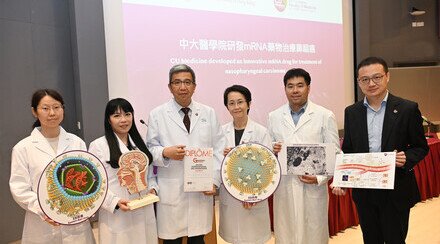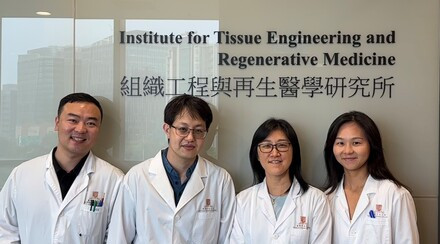CUHK Uncovers Novel Immune Escape Mechanism of Cancer Opening Up New Direction for Cancer Immunotherapy
A recent study by the Faculty of Medicine at The Chinese University of Hong Kong (CUHK) has uncovered how cancer cells defeat the frontline of immunity, thereby promoting tumour progression. The research team found that cancer cells can suppress innate immunity in the tumour microenvironment through activating a key molecule - Smad3. This new finding has led to a preclinical study with promising results that opens up an unexplored area of ‘immunotherapy’. The findings have been published in the leading international scientific journalNature Communications.
Cancer has long been the leading cause of death in Hong Kong. One of the major challenges of antitumour treatment lie in the mutations in cancer cells that facilitate their escape from therapies after a period of time. In recent years, scientists have started to find hints in the surrounding environment of cancer cells affecting their growth – the tumour microenvironment – for beating cancer.
Controlling tumour microenvironment becomes a new strategy of anticancer therapy
The tumour microenvironment describes the non-cancerous cells present in a tumour. These include immune cells, fibroblasts, cells that comprise blood vessels, as well as substances that support the growth of cancer cells.
Transforming growth factor-beta1 (TGF-β1), a multifunctional protein is well-documented as a tumour promoter. Researchers found that cancer cell-derived TGF-β1 supports growth of cancer cells by suppressing the host innate immunity in the tumour microenvironment.
The mechanism behind is that TGF-β1 activates Smad3, a key mediator of the signaling pathway, in order to suppress Natural Killer cell (NK cell) immunity against cancer. NK cell is an important component of the first line immune defence against cancer. The CUHK team further investigated the underlying mechanism with two syngeneic mice tumour models (with invasive lung carcinoma and melanoma respectively). Compared to the control group, mice with Smad3-free microenvrionment were protected against tumour growth, invasion, metastasis and death.
Prof. Hui Yao LAN, Choh-Ming Li Professor of Biomedical Sciences and Assistant Dean (Research), Faculty of Medicine, CUHK elaborated, ‘We observed a 10-fold increase in NK cell production and enhanced cancer-killing activities in the Smad3-free tumour microenvironment. This suggests that Smad3 is an important checkpoint for TGF-β mediated immunosuppression in the tumour microenvironment.
Smad3 inhibition as a new target for immunotherapy
The CUHK team further proved that Smad3 can directly inhibit the expression of E4BP4 gene, the master transcription factor for NK cell production, thereby suspending NK cell production. Removal of Smad3 can thus restore the development of NK cells and thereby inhibiting cancer progression.
Dr. Patrick Ming Kuen TANG, Research Associate, Department of of Anatomical and Cellular Pathology, Faculty of Medicine, CUHK said, ‘These novel observations have led us to the hypothesis that targeting Smad3 in the tumour microenvironment may awake patients’ NK cell immunity against cancer.’
Inspired by these findings, pre-clinical works of Smad3-targeted anticancer therapy has been started by treating two syngeneic mouse tumour models with a Smad3 inhibitor. Results showed that systemic treatment with Smad3 inhibitor can effectively suppress cancer progression by increasing NK cell production and anticancer activity as well as reducing other cancer-promoting factors in the tumour microenvironment.
Prof. Ka Fai TO, Chairman, Department of Anatomical and Cellular Pathology, Faculty of Medicine, CUHK said, ‘NK cell being the main effector cells in innate immunity is the first and powerful immune defence mechanism against cancer. However, cancer cells manage to suppress NK cells activities in the tumour microenvironment and grow into invasive tumour. Boosting up NK cells activities is a promising anti-cancer approach, but the success is limited by the lack of understanding how cancer cells suppress NK cells. This study has identified the key immune regulator and suggested a novel immunotherapeutic strategy to awake our own immunity to fight against cancer.’
Professor LAN added, ‘We are trying to apply the concept of Traditional Chinese Medicine “Yin & Yang(陰陽)”. In this study we discovered that cancer cells can block NK cells production via activating Smad3, resulting in a loss of the bright side “Yang” of our immunity. The use of an optimal tranditional Chinese medicine formula may help inhibit Smad3 activation and rebalance the “Yin &Yang” in the tumour microenviornment, i.e. the concept of “strengthening the vital but eliminating the pathogen”(扶正抑邪). This formula may represent a novel, effective and safe anti-cancer treatment.
The research team is also working on a new form of Smad3 inhibitor by applying nanotechnology, which may open up a new direction of cancer immunotherapy.

The Faculty of Medicine of CUHK uncovers how cancer cells defeat the frontline of immunity, thereby pointing new direction for immunotherapy. From left: Prof. Ka Fai TO, Chairman, Department of Anatomical and Cellular Pathology, Faculty of Medicine, CUHK; Prof. Hui Yao LAN, Choh-Ming Li Professor of Biomedical Sciences and Assistant Dean (Research), Faculty of Medicine, CUHK; Dr. Patrick Ming Kuen TANG, Research Associate, Department of of Anatomical and Cellular Pathology, Faculty of Medicine, CUHK.

Prof. Hui Yao LAN (centre) says the study identifies Smad3 as a key immune regulator, and hence opens up a new direction for immunotherapy.

The target of the new suggested immunotherapy approach is to resume the immunity of NK cells through inhibition of Smad3, thus to kill cancer cells.











































































